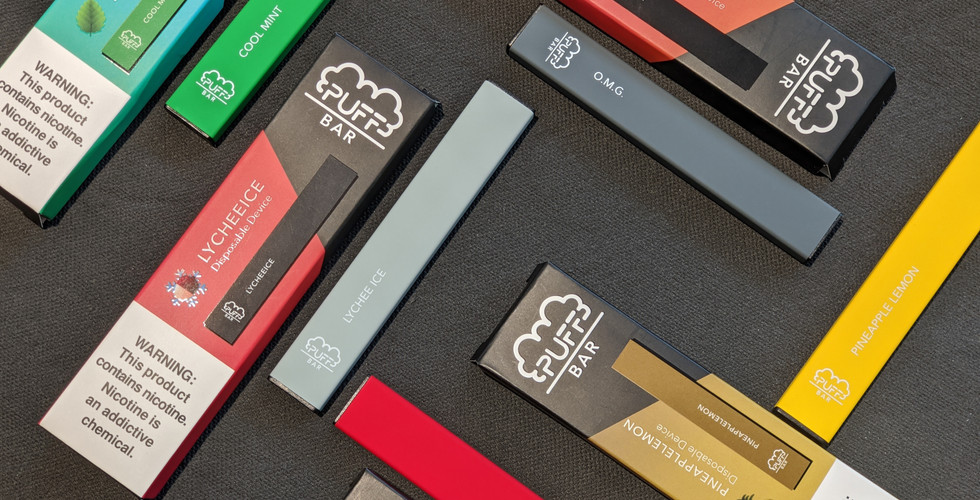What are Puff Bars?
- SUP Coalition
- Jun 1, 2020
- 3 min read
If anyone thought the new flavored e-cigarette regulations were going to solve the youth vaping epidemic, they haven’t heard of Puff Bars.
Puff Bars mimic the massively popular JUUL and its many copycat e-cigarette devices, but are designed for one-time use. They come in many youth-appealing flavors, including O.M.G (Orange, Mango, Guava), but are not subject to the new federal policy regulating flavored e-cigarettes. That’s because they are disposable — one of the many exemptions and loopholes in the new policy, which only restricts flavors for closed-system e-liquid cartridges, like JUUL and its pods, and does not apply to refillable cartridges or disposable products.
Here are some important things to know about this type of e-cigarette.
How popular are disposable e-cigarettes?
The lack of regulation and enforcement around e-cigarettes opened the door for a proliferation of products. Newer disposable devices have grown in popularity as JUUL halted sales of some sweet and fruity flavors last year under scrutiny for its leading role in the youth e-cigarette epidemic.
Online search trends suggest that disposable e-cigarettes are increasing in popularity. A December article in the journal Tobacco Control, “The rise of disposable JUUL-type e-cigarette devices,” reports that a Google search resulted in 31 brands of disposable products on the first results page, with devices “priced as low as $4.60 with up to 7% nicotine (a higher concentration than JUUL) and advertising 200 puffs.”
These products are priced significantly lower than JUUL, which costs up to $34.99 for the device with JUUL pods sold separately in the U.S. According to the article: “disposable products may surge in popularity with minors and prompt users of all ages to try and become addicted to vaping when they might not have tried it otherwise due to the cost of entry.”
How does a Puff Bar work?
Puff Bars share many similarities to JUUL, but have some key differences.
Just like JUUL, a Puff Bar is small enough to fit in a pocket, resembles a USB flash drive and heats up a cartridge containing e-liquid to create a vapor.
Each pod device is pre-charged and pre-filled. Once the vapor runs out, it cannot be recharged or refilled – standing apart from JUUL with its one-time use.
Does Puff Bar have nicotine?
Each Puff Bar uses nicotine salts a formula that allows for much higher levels and efficient delivery of nicotine with less irritation compared to earlier generations of e-cigarettes. Nicotine strength can be as high as 5% in Puff Bars, just like JUUL.
Many young people are not aware of their nicotine consumption when using e-cigarettes. In fact, results from a April 2018 Truth Initiative study published in Tobacco Control show that nearly two-thirds — 63% — of JUUL users aged 15-24 were unaware that JUUL always contained nicotine. Young people who vape are not only risking nicotine addiction — the effects of nicotine exposure could also be harming brain development, altering nerve cell functioning and changing brain chemistry.
What flavors do Puff Bars come in?
Sour Apple, Menthol, O.M.G (Orange, Mango, Guava), Mango and Lemonade are just some of the many flavors Puff Bar carries. Similar to the way tobacco companies have long marketed flavored products to appeal to youth, Puff Bars emphasize flavors with bright colored packaging and use descriptive names.
Flavors play a significant role in drawing youth and young adults to start smoking. In fact, 97% of all youth who vape use flavored e-cigarettes.
Aren’t Puff Bars and other disposable e-cigarettes bad for the environment?
E-cigarettes like JUUL have already raised environmental concern. JUUL pods often do not make it into the trash and compound the issue of tobacco product litter. The heavy metals like lead and nickel in e-cigarettes, as well as nicotine, can leak, which may qualify e-cigarettes as both e-waste and biohazard waste. For an e-cigarette like Puff Bar to be marketed as disposable with only minimal instruction disposal instruction intensifies environmental concerns.
As the Food and Drug Administration continues to fail to do its job of fully regulating e-cigarettes, more than 2,700 cases of vaping related illnesses have been reported across 50 states with 60 deaths. Truth Initiative strongly urges the administration and the FDA to reconsider its policy and restrict access to all flavored e-cigarettes in all retail outlets until they have gone through the pre-market review clearly required by law.
Source: Truth Initiative














Comments